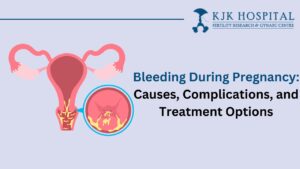
A pregnancy test can be the happiest and most exciting moment of your life; it can also be a period of worry and uncertainty about the future. Though among the many emotions, expectant mothers might be feeling, the well-founded question about the welfare of their child, which they might be trying to find the answer to, can easily be achieved by a directed concern for bloody discharges. It is a common issue that affects many pregnancies, yet its causes are often not clear. This blog aims to enlighten readers on the causes, implications, and treatment of bleeding during pregnancy so that they can be fully aware and try to avert such situations. Whether you’re seeking information for yourself or someone you care about our ultimate purpose is to bring clarity and comfort to these months that stand out.
What Is Vaginal Bleeding During Pregnancy?
Any sort of bloody discharge from the vagina from conception to childbirth during pregnancy is called vaginal bleeding in pregnancy. It’s a condition that may occur at any time during your pregnancy, and this can make you worry and wonder about it. Even though it may be disturbing, it is important to realize that vaginal bleeding is quite common, experienced by every pregnant woman out of the 4. This blood loss can be either light spotting or heavy bleeding, which may look like menstruation flow. Its origin is either a benign process or a severe disease. This makes it imperative to have adequate knowledge of its nature and consequences. If you’re experiencing bleeding issues during pregnancy, it’s always advisable to consult the best gynaecologist for advice to avoid potential harm to both mother and child.
Symptoms And Causes Of Bleeding In Pregnancy
Bleeding during pregnancy may take numerous forms and be derived from several reasons. Each of them is important for the mother-to-be and the unborn baby. Comprehending the signs and causes is necessary for a timely and relevant response.
Symptoms of Bleeding During Pregnancy
The personal appearances of blood vary based on colour, texture, and volume. There could be light spotting, which is barely visible, or even heavy bleeds with clots that are similar to those that result in hairy periods. The colour of the blood can also be a signal about the reason and time: for instance, certain features such as dark or light spotting on your pad can be less alarming as compared to bright-red blood patches; this bleeding is fresh, and it’ll come with other symptoms like back or abdominal pain, fainting, or dizziness. These are all possible causes of an emergency that will require a paramedic on-site.
Causes of Bleeding During Pregnancy
Bleeding during pregnancy can be a cause for concern and may indicate various underlying issues. There are three stages of bleeding during pregnancy: the first trimester, the second trimester, and the third trimester
First Trimester Causes
During the first trimester of pregnancy, vaginal bleeding can be caused by various factors. These include:
- Implantation Bleeding: This type of bleeding marks the time when the embryo is implanted into the uterine lining, making it the earliest form of bleeding that a mother carrying a baby might experience at this stage. Pregnancy symptoms usually start around 10 to 14 days after conception, and they are normally not very serious. They don’t cause any harm, either.
- Miscarriage: Miscarriages are very common in pregnancies that are within the first 20 weeks, and they are quite commonly experienced, with bleeding being one of those first signs. Be walking pains with them, the bleeding can vary in intensity.
- Ectopic Pregnancy: It’s known to happen when, after getting fertilized, the embryo attaches itself outside the uterus, generally in the tube. It is a very important condition that may lead from moderate bleeding to serious bleeding and needs a complex medical strategy.
- Molar Pregnancy: An anomaly characterised by the abnormal growth of undifferentiated tissue in the uterus that would otherwise give a normal pregnancy. Out bleeding, most commonly observed as dark brown or bright red-coloured blood, is one of the components.
Second and Third Trimester Causes
During the second and third trimesters of pregnancy, bleeding can still occur and may be attributed to several factors. These are:
- Placenta Previa: This condition accounts for the situation where the placenta gets to the extent of covering parts or, rather, full of the cervix. It might lead the patient to experience bleeding that happens suddenly and painlessly during the 3rd trimester, and medical help is required.
- Placental Abruption: A severe condition that undergoes detachment or full separation of the placenta from the uterus way before parturition; this causes bleeding from the abdomen besides pain.
- Preterm Labour: If bleeding occurs in your third trimester, the possibility of your body going into labour is increased, especially if you experience contractions, back pain, and changes in vaginal discharge regularly.
- Cervical Changes: During pregnancy, the cervix may become more sensitive and prone to bleeding, especially after examinations or sexual intercourse.
It is true that bleeding during pregnancy may be a sign of a serious disease. However, it does not always mean so. Nevertheless, any bleeding during pregnancy should be reported to a health provider immediately. Although all pregnancies are different, what may seem normal for one person may not be so for another. Communication with healthcare providers, careful body assessment, and early seeking of professional advice whenever something feels wrong are the key factors in taking full control of pregnancy in the most efficient and safe way.
Treatments For Bleeding In Pregnancy
The initial step in the management of bleeding in pregnancy is to identify the specific cause and the foetal age, as these are critical in determining a suitable approach to treatment. Bleeding types can vary from light to extreme, making treatment specific to the patient’s corresponding ailment and prioritising the emotional and physical wellbeing of both the mother and the baby.
Observation and rest
If the bleeding is just mild light spotting, like the one that happens after fertilisation or vaginal alteration, your doctor is very likely to advise no specific treatment for such instances but to just rest and watch. Avoid having sex in the absence of spermicide and regarding tampons, as well as pay attention to the bleeding; it is important. Resting for two days is preferred as it gives the body a chance to relax from too much strain, which would worsen the bleeding.
Medical Management
In cases where the bleeding is due to a treatable condition, such as a hormonal imbalance or infection, medical management may include:
- Hormonal Supplements: In cases where a low level of pregnancy hormones is observed, the doctor will prescribe some additional supplements to support you during pregnancy.
- Antibiotics: If the bleeding is caused by an infection, such as the presence of bacteria, antibiotics will be administered to treat the infection and hopefully stop or reduce the bleeding.
Surgical Interventions
For more severe conditions, such as ectopic pregnancy or molar pregnancy, surgical intervention may be necessary.
- Laparoscopy: In the treatment of ectopic pregnancies, the laparoscopic surgery mode may be adopted to remove the ectopic tissue with the aim of ensuring the health of the mother.
- Dilation and Curettage (D&C): If one has a miscarriage or molar pregnancy, a D&C process can be done to eradicate the tissue from the womb.
Specialised Care for Complications
Conditions like placenta previa or placental abruption require specialised care and may involve:
- Hospitalisation: Close monitoring of the mother and foetus in case of significant blood loss or preterm labour signs is crucial.
- Delivery: In certain instances, particularly when the foetus is in distress or when the mother’s health is at risk, early delivery may be the only viable choice. This could be by induced labour or a caesarean section, depending on the case and gestational age.
With each episode of bleeding during gestation, the physician has to individually evaluate and act accordingly. The main aim is always to protect the mother and her baby from any harm. Communication with healthcare providers, following their advice, and attending all scheduled prenatal appointments is a key part of positive management of pregnancy problems and receiving good care.
What Are The Problems With Bleeding During Pregnancy?
Unsafe bleeding is known to be responsible for many risks and complications during pregnancy, apart from the mother, whose situation greatly varies with the baby as well. When mentioned as the main concern, one might think about spotting, which means the miscarriage danger or, at least, happens in the first period of pregnancy when the risk factor of the termination of the pregnancy is highest. In the final months, issues like placenta previa and placental abruption can happen (they can decrease the nutrient and oxygen supply, suggesting that the baby is not getting enough nutrients from the placenta and may develop abnormalities, and the mother may develop major bleeding and may have some problems with it).
Also, bleeding is a sign of preterm labour that is associated with an increased possibility of premature birth and can lead to prolonged hospitalisation and developmental problems in newborns. Knowing these risks emphasizes that early medical care is vital when pregnancy bleeding occurs at any time so that the health of the mother and the child will not be compromised.
Complications Of First-Trimester Bleeding
First-trimester bleeding, although frequent, can be a source of big worries because of the potential complications it evokes and the emotional burdens it may bring. Knowledge of the consequences of bleeding during this period is vital for faster and more efficient management of it.
Miscarriage
One of the most widely known implications of first-trimester bleeding is a miscarriage or the termination of a pregnancy that occurs before 20 weeks. Bleeding is one of the first telltale signs, sometimes ending in miscarriage. However, not all bleeding prompts miscarriage, requiring prompt evaluation. Miscarriages can be very difficult emotionally, as sometimes they also have physiological consequences, which can require medical follow-up to guarantee a complete recovery.
Ectopic Pregnancy
Ectopic pregnancy cases occur when the sperm manages to fertilise the egg, but the embryo implants outside the uterus surrounding the fallopian tube. Bleeding that conflicts with a successful pregnancy in the first trimester could be a sign of a fatal disease, which can only be addressed immediately with medical intervention. The gravity of an ectopic pregnancy without treatment is internal bleeding, which, if not well monitored, could result in the death of the mother.
Infection
Early bleeding may imply having an infection in the cervix and/or uterus, and the signs of this infection are also present in vaginal discharge. The infections that some bodily bacteria may cause could not only be detrimental to the health of the mother but also carry consequences for the foetus, which may result in the mother having a threatening pregnancy or early delivery of the baby.
Hormonal Imbalances
The first trimester’s bleeding can point out hormonal disturbances causing difficulties for the mother’s body that can contribute to the risk of pregnancy. Progesterone is the key one for the proper functioning of the inner uterus liner as well as for a successful pregnancy; a deficiency of it may result in bleeding, which requires medical intervention to prevent miscarriage.
Psychological Impact
Besides the physical issues, first-trimester haemorrhage can also impact the mind in a number of ways. It can produce deep anxiety, with possible psychological stress affecting the wellbeing of the mother. The fear of losing the pregnancy may be so great that it drowns out the joy. Hence, support and counselling should also be offered during care for women with bleeding in early pregnancy.
When Is Bleeding Serious In Pregnancy?
Bleeding during pregnancy can be mild, like spotting or severe haemorrhaging, and deciding when it becomes a concern for the health and safety of the mother and the baby is paramount in such a situation. Specific circumstances and symptoms correlated with abnormal bleeding indicate that there may be more severe underlying health problems that need immediate medical intervention.
Heavy bleeding, especially if accompanied by blood clots or tissue coming from the vagina, is an obvious sign of a potentially severe complication. Such bleeding may be a signal of miscarriage, ectopic pregnancy, or placenta complications like previa or abruption in the initial stages or later. Additionally, bright red and persistent bleeding, as opposed to light spotting that goes away on its own, is a red flag and calls for immediate assessment. The colour and consistency of the blood could give out significant hints. Brighter red blood would be more alarming than the darker, aged blood.
Symptoms that can occur during bleeding might reflect the seriousness of the condition. If bleeding is in conjunction with sudden, progressing pain in the belly or back, it could be a sign of a miscarriage or ectopic pregnancy. Also, bleeding accompanied by the appearance of labour signs, such as regular contractions or a sudden flow of fluid before 37 weeks of pregnancy, can indicate preterm labour, which is dangerous for the foetus.
Lastly, any bleeding during the second or third trimester is particularly concerning due to the higher risk of complications such as placental abruption or previa. Even minor bleeding is a reason to seek medical advice promptly at this stage.
Understanding these scenarios where bleeding may be serious empowers pregnant individuals to seek timely medical intervention, potentially preventing more severe complications and ensuring the best possible outcomes for their pregnancies.
When Do We Need The Doctor’s Help?
Bleeding, at any stage of pregnancy, signals a need for medical assistance, but some signs are more urgent than others and require immediate medical attention. If blood loss is heavy, as in the menstrual period, or accompanied by severe cramps, abdominal or back pain, dizziness, or the passing of tissue, the patient should be taken to medical facilities at a glance. Such symptoms could mean a miscarriage, an ectopic pregnancy, or other severe problems. Moreover, any bleeding in the second or third trimester is distressing, and you need to urgently call or visit your healthcare provider. Always bear in mind that timely medical counsel will be the difference between managing potential complications for both the mother and the child with safety in mind.
Conclusion
While a pregnancy-associated bleed may come off as a scary thing, getting to know its causes, complications, and when to seek medical help is the only way you can guarantee the health of the mother and her baby. KJK Hospital is the best IVF centre in Trivandrum, with a strong commitment to helping couples achieve their dream of parenthood. They are a lighthouse in the stormy sea of frustrations and anxieties of mothers-to-be with these issues. With specialized maternal care, KJK Hospital has a wide range of services, from prenatal diagnostics to emergency care, which guarantees that every detail of pregnancy and childbirth is addressed with professionalism and kindness. KJK Hospital, being staffed by professionals with specialized skills, is geared towards the provision of quality care to families, making pregnancy less complicated and more hassle-free. Fore more information feel free to contact us.
Phone Number: 8921727906 , 918547424080
Email : info@kjkhospital.com





